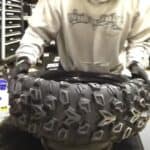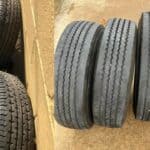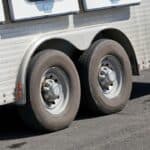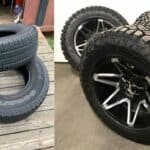There is no single answer to the question of whether bigger tires are better for trailers. It depends on a number of factors, including the type of trailer, the terrain, and the weight of the load. Some experts say that larger tires provide more stability and traction, while others argue that they can make a trailer harder to control.
Ultimately, it is up to the individual trailer owner to decide what size tire is best for their needs.
There are many factors to consider when choosing tires for your trailer.Bigger is not always better when it comes to selecting tires for your trailer. Depending on the size and weight of your trailer, as well as the type of terrain you’ll be traveling on, you’ll want to choose tires that are appropriate for the job.
For example, if you have a small lightweight trailer, you might be able to get away with using smaller tires.
However, if you have a large heavy duty trailer, you’ll need larger tires to support the weight and provide proper traction.
It’s also important to consider the type of terrain you’ll be traveling on. If you’re only going to be using your trailer on paved roads, then any size tire will likely do the job just fine.
But if you’re planning on taking your trailer off-road or onto rougher terrain, then bigger tires will definitely be better. Larger tires provide more ground clearance and are less likely to get punctured or damaged on rough roads.
So when it comes to choosing tire size for your trailer, there’s no one-size-fits-all answer.
It all depends on the specific needs of your vehicle and what type of driving conditions you’ll be encountering. Be sure to do some research and talk to an expert before making a final decision so that you can choose the best possible option for your situation.
Are Bigger Tires Better for Trailers?
Does Wheel Size Matter on a Trailer?
It’s a common question asked by those new to towing: does wheel size matter on a trailer? The simple answer is yes, wheel size does matter when it comes to trailers. Here’s a closer look at why that is and what you need to know about choosing the right size wheels for your trailer.
The main reason why wheel size matters on a trailer is because of the effect it has on tongue weight. Tongue weight is the downward force exerted on the hitch ball by the trailer coupler. It’s important to have enough tongue weight so that the trailer can be properly balanced and won’t sway while being towed.
If your trailer has too much tongue weight, the wheels will have a hard time staying in contact with the ground, which can lead to problems like tire slippage or even blowouts. On the other hand, if there isn’t enough tongue weight, your trailer may be more likely to fishtail or jackknife.
So how do you know what size wheels are best for your trailer?
A good rule of thumb is to choose wheels that are about 1/3 of the width of your trailer’s tires. So, if you have tires that are 10 inches wide, you would want wheels that are approximately 3 inches wide. This will help ensure that you have proper tongue weight and won’t run into any problems while towing your trailer.
Are Bigger Or Smaller Tires Better for Towing?
There is no definitive answer when it comes to whether bigger or smaller tires are better for towing. It ultimately depends on a variety of factors, including the type and size of the vehicle being towed, the terrain, and the weight of the load being towed.
For example, if you’re attempting to tow a large trailer up a steep hill, you’ll likely need larger tires in order to get enough traction.
On the other hand, if you’re just trying to tow a small boat on level ground, smaller tires may be sufficient.
In general, however, it’s often advisable to err on the side of caution and go with larger tires when possible. That way you’ll be less likely to run into problems down the road.
What is the Best Tire to Put on a Trailer?
There are a few things to consider when choosing tires for a trailer. First, you need to know the weight of the trailer and what it will be carrying. Second, you need to decide on the size of tire that will best fit your needs.
Third, you need to think about the type of terrain you’ll be traveling on most often.
The weight of the trailer is important because it affects how much stress is put on the tires. If the trailer is carrying a lot of weight, then you’ll need tires that can handle that amount of weight without wearing out quickly.
If the trailer isn’t carrying much weight, then you can get away with using lighter-duty tires.
The size of tire is also important because it affects how easy the trailer will be to tow. Larger tires make it easier to tow a heavy trailer, but they also make it more difficult to maneuver around tight corners.
Smaller tires make it harder to tow a heavy trailer, but they’re easier to maneuver around tight corners. Choose the size of tire based on how often you’ll be pulling the trailer and where you’ll be taking it most often.
If you plan on doing mostly highway driving, then all-season or highway tread patterns will work well for you. But if you plan on doing a lot of off-road driving, then mud-terrain or all-terrain tread patterns would be better suited for your needs. Consider where you’ll be driving most often and choose accordingly.
All in all, there’s no one “best” tire to put on a trailer – it depends on your specific needs and preferences.
Is There an Advantage to Bigger Tires?
Bigger tires definitely have their advantages. The main advantage is that they provide better grip on the road, which is especially important in bad weather conditions. They also make your car more stable and less likely to skid or slide on slippery surfaces.
Additionally, bigger tires improve your car’s handling and give you a smoother ride. Finally, they simply look better and can make your car stand out from the crowd.
If you’re thinking of upgrading to bigger tires, keep in mind that you may need to make some adjustments to your car’s suspension system to accommodate the larger size.
You’ll also want to be sure that the new tires are compatible with your car’s rims. But overall, bigger tires are definitely worth considering if you want improved performance and style for your vehicle.
How to Put Bigger Tires on a Trailer
Are you looking to put bigger tires on your trailer? If so, there are a few things you need to know before doing so. First, you need to make sure that the new tires you want to put on your trailer will fit.
To do this, you need to measure the width of the new tires as well as the diameter. Once you have these measurements, compare them to the existing tires on your trailer. The new tires should be no more than 3 inches wider than the existing ones and no more than 2 inches taller.
If the new tires will fit, then you can proceed with putting them on your trailer. Start by jacking up the trailer and removing the existing tires. Be careful when doing this so that you don’t damage the rims.
Next, put the new tires on and hand-tighten the lug nuts. Once all four tires are on, lower the trailer back down and use a lug wrench to tighten each nut until it is snug. You don’t want to over-tighten them or they could break off.
Now that your bigger tires are installed, enjoy hitting those trails with your trailer!
Best Size Tires for Utility Trailer
Most utility trailers are designed to be used with specific tire sizes. However, there are some general guidelines that can help you choose the best size tires for your utility trailer.
The first thing to consider is the weight of your trailer.
Heavier trailers will need stronger tires that can handle the extra weight. You’ll also want to consider the type of terrain you’ll be using your trailer on. If you’ll be traveling on rough roads or off-road, you’ll need tougher tires than if you’re just sticking to paved surfaces.
Another important factor is the width of your trailer’s wheels. Wider wheels provide stability and traction, but they can also make your trailer harder to maneuver. Narrower wheels are easier to turn, but they might not offer as much grip on slippery surfaces.
Once you’ve considered all of these factors, you can start looking at specific tire sizes. For a small utility trailer, 22″ x 8″ tires might do the trick. For a larger one,you might need something like 26″ x 12″ tires.
Ultimately, it’s up to you to decide what size tires will work best for your particular utility trailer and driving needs.
Putting Bigger Tires on Boat Trailer
If you have a boat trailer, you may be wondering if you can put bigger tires on it. The answer is yes, but there are a few things to keep in mind.
First, bigger tires will add weight to your trailer.
This means that your trailer will require more power to tow and may impact your gas mileage. Additionally, the extra weight could cause wear and tear on your tow vehicle over time.
Second, you’ll need to make sure that the new tires fit within the existing fenders and wheel wells.
If they’re too big, they could rub when turning or going over bumps. This could damage both the tires and the fenders themselves.
Finally, remember that bigger isn’t always better.
Tires that are too large could decrease traction and make it harder to control your trailer on the road. Stick with a moderate size increase to avoid any problems down the road.
What Wheels Fit My Trailer
If you’re wondering what size and type of wheels will fit your trailer, there are a few things to consider. First, check the tire size. The next thing to look at is the bolt pattern.
The most common sizes are 5 lug and 6 lug, but there are a few other possibilities as well. Finally, make sure that the load rating on the tire is high enough for your needs.
There are a number of different places to buy trailer wheels, so shop around until you find a good deal. When you’re ready to purchase, be sure to install them properly so they’ll last for years to come.
Trailer Tires
Most people don’t think about their trailer tires until they have a blowout or some other type of tire failure. But it’s important to keep your trailer tires in good condition, because they play a crucial role in keeping your trailer safe on the road. Here are some tips for maintaining your trailer tires:
1. Check the air pressure regularly. Trailer tires should be inflated to the manufacturer’s recommended pressure, which is usually higher than what you would inflate car tires to. Under-inflated trailer tires can overheat and fail, so it’s important to check them often and top off the air as needed.
2. Inspect the treads regularly. Worn-out treads can cause traction problems and make it more likely for you to have an accident. Take a close look at your trailer tires’ treads every few weeks or so, and replace them when they start to get worn down.
3. Don’t overload your trailer. Overloading puts extra strain on your trailer tires, which can lead to blowouts and other problems. Make sure you’re not carrying more weight than your Trailer Tires are rated for!
4. Be careful when backing up. When you’re backing up with a loaded trailer, be extra careful not to put too much strain on the Trailer Tires by turning too sharply or going too fast.
Can You Put Smaller Tires on a Trailer
If you have a trailer with larger wheels and tires, you may be wondering if you can put smaller tires on the trailer. The answer is yes, but there are a few things to keep in mind.
First, smaller tires will have a lower load capacity than larger ones.
This means that you’ll need to be careful not to overload your trailer. Second, smaller tires may not provide as much stability as larger ones. This is something to keep in mind if you’re hauling a heavy load or travelling at high speeds.
Finally, you’ll need to make sure that the smaller tires fit onto the trailer’s axle without any issues.
Overall, it’s perfectly fine to put smaller tires on a trailer. Just be aware of the potential downsides and take care when loading up your trailer.
Truck Tires on Trailer
If you’re towing a trailer behind your truck, it’s important to make sure that the tires on the trailer are in good condition. Here are some tips for maintaining your trailer tires:
– Check the tread depth regularly.
The tread should be at least 4/32 of an inch deep. If it’s not, replace the tire.
– Keep the tires inflated to the proper pressure.
This can help prevent flats and extend the life of the tire.
– Inspect the tires for any signs of damage, such as cracks or bulges. If you see any damage, replace the tire immediately.
– When storing your trailer, keep it off of concrete to prevent flat spots from forming on the tires.
Conclusion
Are Bigger Tires Better for Trailers? As anyone who has ever towed a trailer knows, the right tires are crucial. The wrong tires can lead to problems like flats, blowouts, and loss of control.
So it’s important to choose the right size and type of tire for your trailer. But what about going bigger? Are bigger tires always better for trailers?
The short answer is: it depends. There are pros and cons to using larger tires on a trailer. Here’s a look at some of them:
PROS:
• Larger tires can provide better traction and stability, especially in off-road or wet conditions.
• They can also absorb bumps and jolts better than smaller tires, making for a smoother ride.
• Some experts say that larger tires can extend the life of your axle by distributing weight more evenly.
CONS:
• Larger tires typically cost more than smaller ones.
• They may also require stronger springs and suspension components to support the extra weight.
• In some cases, larger tires can actually reduce traction due to their increased contact area with the ground (think of a car spinning its wheels in mud).









